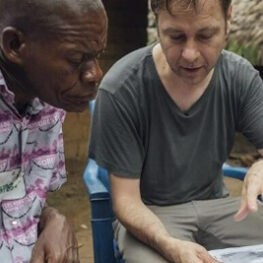A researcher who exposed the threat that climate change poses to tropical forests in Africa has been
elected a Fellow of the Royal Society, one of the highest accolades in science.
Simon Lewis, Professor of Global Change Science in the School of Geography, said the Fellowship was the culmination of “two decades of teamwork” involving people from all over the world.
He said he was surprised to get such a “cool” honour, and he hoped it would help direct attention to the
challenges facing tropical forests and the communities that rely on them.
At Leeds, Professor Lewis is leading a five-year interdisciplinary study into the impact of climate change
on the Congo peatlands, one of the largest stores of sequestered carbon in the world.
Called CongoPeat, the research project estimates that around 30 billion tonnes of carbon are held in the
peat. If – as some climate models predict – the Congo forests get warmer and drier as a result of climate change, the carbon may be released into the atmosphere, adding to greenhouse gas levels that are
causing climate change. Professor Lewis and his team are working out how likely that is.
Research published last year revealed how previous climate change events resulted in the peatlands
releasing carbon. The project is funded by the Natural Environment Research Council and findings from
the research are being used to inform climate change policies.
Pioneering scientists
Fellowship of the Royal Society – which is the UK’s national academy of sciences and the oldest science
academy in continuous existence – recognises individuals who have made a “substantial contribution to
the advancement of science.” Past Fellows include Professor Stephen Hawkin and Isaac Newton and
among current Fellows is Leeds’ Chancellor, Professor Dame Jane Francis and Gregor Houseman,
Emeritus Professor of Geophysics, both elected in 2021.
Speaking about the award, Professor Lewis said: “I am really, really pleased, and to be honest a bit
surprised.
“This honour is very cool, and is really a moment of recognition of two decades of teamwork. My election
as a Fellow of the Royal Society rests on the hard work of many PhD students, post-doctoral researchers
and scientists from all over the world.
“I have done a lot of fieldwork in tropical forests and remote tropical swamps, often to places where few
scientists go, relying on the generosity of local people in hosting our field teams. I hope this honour helps
me direct attention to the need to better protect tropical forests and improve the livelihoods of those
who depend on them.”
Professor Lewis’s wider research is around how human activity impacts on the “earth system”,
particularly tropical ecosystems. It has helped identify the interplay between forests, deforestation and
climate change.
‘Fantastic and fitting honour’
Vice-Chancellor and President Professor Simone Buitendijk said: “This is a fantastic and fitting honour for Simon whose research is highlighting one of the most critical issues around climate change: how to
protect those natural systems that protect us all from damaging changes to climate.
“By working with local communities and nurturing networks of scientists and researchers, he is playing a
key role in identifying potential solutions to the big problems facing the world. His approach epitomises
the way we do research at Leeds.”
Announcing 80 new Fellowships, the President of the Royal Society, Sir Aidrian Smith, said: “I am
delighted to welcome our newest cohort of Fellows”.
“These individuals have pushed forward the boundaries of their respective fields and had a beneficial
influence on the world beyond.
“Among this year’s intake are individuals who were at the forefront of the response to the COVID-19
pandemic, and those working on global challenges, from TB to climate change. They are pioneering scientists and innovators from around the world who have confounded expectations and transformed our thinking.”
Professor Lewis also holds the chair in Global Change Science at University College London.
